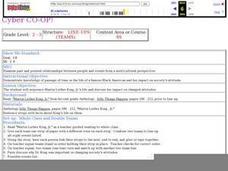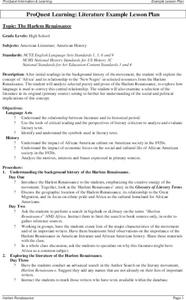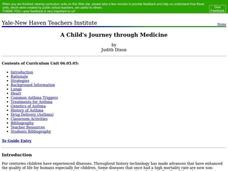Curated OER
Defined: The Different Types of Government
The world is a big place, so it only stands to reason that different forms of government exist. Democracy, autocracy, oligarch, monarch, and dictatorship are all defined. An extensive explanation of US government system is also included....
Curated OER
The Terrible Transformation: Freedom Denied
High schoolers learn about the legal foundations for slavery and explore autobiographical writings of slaves. Students trace the development of laws that enforced the slave status of Africans and their descendants.
Curated OER
Revolutionary Women Portraits: Finding and Viewing New Perspectives
Students identify and analyze portraits of Revolutionary-era women. Creating a concept web, they record the actions by women during the war to be made into a chart and timeline. They discuss the cultural and social expectations of women...
Curated OER
Education: Passing Enough Knowledge to Survive to the Next Generation
Learners compare and contrast the knowledge requirements for human and animal children. They identify the consequences of an animal if it is unprepared for the given environment. They discover the importance of education as well.
Curated OER
Emergency Preparedness
Students are introduced to governmental and humanitarian responses to disasters. They research organizations such as FEMA and the Red Cross. They examine their local National Guard unit as well.
Alabama Department of Archives and History
The Great Depression - Hard Times Hit America
To gain an understanding of how the Great Depression affected everyday citizens, class members examine letters written either to the president or to the governor of Alabama asking for assistance.
Constitutional Rights Foundation
Arizona v. United States — States and Immigration Law
As part of a study of immigration law, class members read a summary of the Supreme Court case, Arizona v. United States. They then examine a series of examples and acting as federal court judges, must determine if the scenarios...
Curated OER
Acting Like a Third Grader (Part 1)
Third graders, after brainstorming the positive and negative types of behaviors, become aware of the right and wrong way to behave as a third grader. They perform a skit that demonstrates the skills and behaviors used by third grade...
Library of Congress
Industrial Revolution
Could you live without your phone? What about cars, steel, or clothing? Class groups collaborate to produce presentations that argue that either the telephone, the gramophone, the automobile, the textile industry, or the steel...
Curated OER
Preparation and Staining of Mammal Cells to View Sister Chromatids
Observation of sister chromatids is possible as students culture and stain mammal tissue cells.
Curated OER
Dr. Seuss and Universal Themes
Discover some of the themes of Dr. Seuss's major books. They see that despite being written for young people, Dr. Seuss' books contain powerful messages and important themes.
Curated OER
Martin Luther King, Jr. Team Activity
Students sequence the events of Martin Luther King Jr.'s life, after first being read a biography. The facts are on strips of paper, which are later glued end to end.
Curated OER
Children's Organization for Civil Rights
Pupils analyze a speech from Constance Baker Motley, examine student Organization for Civil Rights' documents, and then create their own plan of action for what the C.O.C.R. might be like if it existed today.
Curated OER
Hawthorne: Author and Narrator
Students examine the difference between a narrator and author. They read Nathaniel Hawthorne's novel, 'The Scarlet Letter,' write a description of the narrator, and research how Hawthorne was impacted by the politics of the time.
Curated OER
Arthropod Key
Students identify the types of pests and categorize them. They identify their food chain and create a poster showing the food chain for the pests.
Curated OER
Weeds-Wild and Wonderful
Students compare and contrast weeds and desirable plants. They explore the ways which their ancestors used weeds and depended on them for food and other household necessities.
Curated OER
The Harlem Renaissance
Learners, after researching/analyzing the movement "Harlem Renaissance" and Africa as well as reading literature from that time period, create lists of the major characteristics of the movement and its important writers. They bridge the...
Curated OER
19th Century Women's Suffrage - Sheltered Activities
Students reenact The USA v. Susan B. Anthony and discuss women's suffrage and the 19th Amendment.
Curated OER
A Wolf by the Ear
Students examine Thomas Jefferson's complex and contradictory relationship with slavery.
Curated OER
A Child's Journey through Medicine
Students experience a variety of activities that relate to human physiology and their functions. They create graphs and charts after testing their heart rates and blood pressure They conduct a survey of the student body and create ...
Curated OER
FLY to Success
First graders are asked how they can improve their skills. They are told how they can do better at following directions. Students identify what they need to listen for. They determine the skills needed to get along with others.
American Chemical Society
Using Chemical Change to Identify an Unknown
If you discover an unknown powder, how do you determine if it is safe? Lesson uses four different tests to identify the properties of various powders that appear the same. Then scholars get an unknown powder and have to determine which...
Curated OER
2007 U.S. National Chemistry Olympiad Local Section Exam
Sixty multiple choice questions cover the entire gamut of chemistry concepts. This is the local section of the U.S. National Chemistry Olympiad, where your chemistry candidates take a shot at entering the national competition. They...
Curated OER
2001 U.S. National Chemistry Olympiad Part III
Here is a comprehensive method for assessing chemistry learners' knowledge; have them approach two laboratory problems, plan their methods of solving each, and then actually carry out the experiments to find the answers. Both the...

























